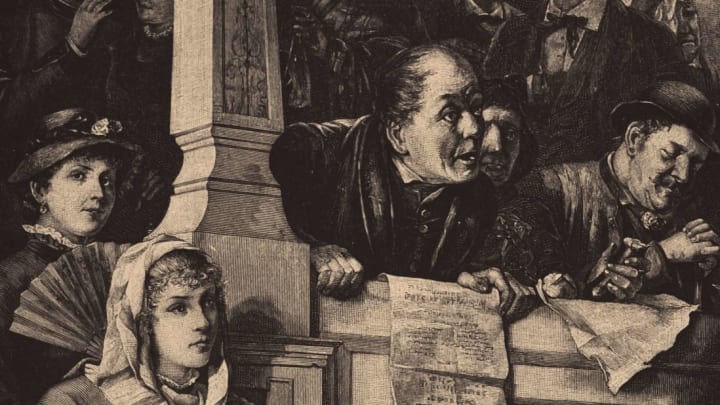In 1909, the English writer James Redding Ware published a dictionary of 19th-century slang and colloquial language called Passing English of the Victorian Era. Relatively little is known about Ware’s life—not helped by the fact that much of his work was published under the pseudonym Andrew Forrester—but among the other works attributed to him are around a dozen stage plays, many of which were first performed in the theaters of London in the late 1800s and early 1900s.
It was this firsthand experience that undoubtedly helped Ware to flesh out his dictionary with a host of slang words and expressions used by Victorian actors, actresses, theatrical producers, and backstage workers. From nicknames for incoherent actors to mooching companions and noisy babies, although many of the entries in Ware’s Passing English have sadly long since dropped out of use, they’re no less useful or applicable today.
1. Agony Piler
An actor who always seems to perform in weighty or sensationalist parts.
2. Back-Row Hopper
An audience member who visits bars frequented by actors and flatters them into buying him a drink.
3. Blue Fire
“Blue fire” was originally the name of a special effect used in Victorian theaters in which a mixture containing sulfur would be ignited to create an eerie blue glow on stage. The effect astonished audiences at the time, who had never seen anything like it before, hence "blue fire" came to be used to describe anything equally amazing or sensational, or that astounded an audience.
4. Bum-Boozer
A heavy drinker.
5. Burst
The sudden swell of people out onto a street when a play ended.
6. Button-Buster
A terrible comedian.
7. Celestials
Also known as “roof-scrapers,” the celestials were the audience members in the “gods” or the gallery, the highest tier of seats in the theater.
8. Charles His Friend
A nickname for any uninspiring part in a play whose only purpose is to give the main protagonist someone to talk to. The term apparently derives from a genuine list of the characters in a now long-forgotten drama, in which the lead’s companion was listed simply as “Charles: his friend.”
9. Deadheads
Audience members who haven’t paid to get in (as opposed to those who have, who were the livestock). Consequently, a nickname for journalists and first-night critics.
10. Decencies
A term referring to an actor’s strategically padded costume, defined by Ware as “pads used by actors, as distinct from actresses, to ameliorate outline.”
11. FLABBERDEGAZ
A fluffed line, a stumbled word, or a mistimed joke. Also called a Major Macfluffer.
12. The Ghost Walks
A reference to the famous opening scene of Hamlet, saying that “the ghost walks” (or, more often than not, that “the ghost doesn’t walk”) meant that there was (or that there wasn’t) enough money to be paid that week.
13. Gin And Fog
Hoarseness caused by heavy drinking the night before.
14. Greedy Scene
A scene in a play in which the lead actor has the stage all to him or herself.
15. Joey
To mug to the audience, or to lark about to attract someone’s attention.
16. Logie
A fake gemstone, or fake jewelry in general. Supposedly named after David Logie, an inventor who manufactured fake jewels out of zinc.
17. Matinée Dog
A nickname for the audience of a matinee performance. To "try it on the matinee dog" meant to test a new act or a new reading of a scene during a daytime performance, as the afternoon audiences were considered less discerning than the more seasoned and more demanding evening audiences.
18. Mumble-Mumper
An old, inarticulate performer whose lines cannot be easily heard or interpreted by the audience.
19. On The Pross
If you’re on the pross then you’re looking for someone to buy you a drink or a meal—pross is a shortening of “prosperous,” in the sense of searching for someone wealthy enough to buy you dinner.
20. Palatic
Very, very drunk. Probably derived from a deliberate mispronunciation of “paralytic."
21. To Play to The Gas
To make just enough money to get by—literally just enough to pay your gas bill.
22. Scorpions
An actor’s nickname for babies, whose constant noise could ruin a performance.
23. Star-Queller
An inferior actor whose terrible performance ruins the excellent performances given by everyone else.
24. Swan-Slinger
The playwright Ben Jonson famously called Shakespeare “The sweet swan of Avon” in a memorial poem published in 1623. A swan-slinger, consequently, is a Shakespearean actor.
25. To Take a Dagger And Drown Yourself
To say one thing but then do another. To stab yourself and pass the bottle, meanwhile, meant to take a swig of a drink and then pass the bottle onto the next person.
26. Thinking Part
A role in which an actor is required to say little or nothing at all. Likewise, a feeder was any role in which an actor was only required to “feed” lines to the more important character.
27. Toga-Play
Also called BC-plays, toga-plays were either classical period dramas, like Shakespeare’s Julius Caesar, or plays by classical-era playwrights.
28. Twelve-Pound Actor
A child born into an acting family.
29. Village Blacksmith
“The Village Blacksmith” is the title of a poem by Henry Wadsworth Longfellow, the third verse of which begins, “Week in, week out, from morn till night, / You can hear his bellows blow.” It was the “week in, week out” line that inspired this expression referring to a performer or worker who isn’t a complete failure, but whose contracts rarely last longer than a single week.
30. Whooperup
A terrible singer.
[This list first ran in 2015 and was republished in 2019]
